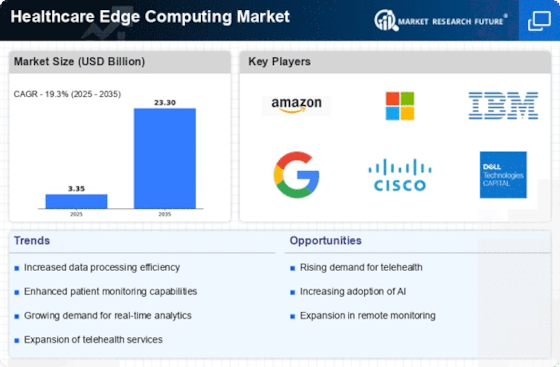Top Industry Leaders in the Healthcare Edge Computing Market

Competitive Landscape of Healthcare Edge Computing Market:
The healthcare edge computing market is experiencing a surge, fueled by the convergence of rising healthcare data volume, the Internet of Medical Things (IoMT), and the need for real-time insights. This dynamic landscape is home to a diverse range of players, each vying for a piece of the pie. This analysis delves into the key players, their strategies, and the factors influencing market share.
Key Players:
- Cisco
- AWS
- Dell Technologies
- HPE
- Huawei
- IBM
- Intel
- Litmus Automation
- Microsoft
- Nokia
- ADLINK
- Axellio
- Capgemini
Factors Influencing Market Share:
- Product Portfolio and Features: The breadth and depth of a company's edge computing offerings, including hardware, software, services, and their compatibility with existing healthcare systems, significantly impact market share.
- Compliance and Security: Healthcare data privacy regulations are stringent. Companies with robust security measures and compliance certifications for healthcare data handling will gain trust and market share.
- Partnerships and Collaborations: Strategic partnerships with healthcare providers, research institutions, and other technology players can accelerate adoption and expand market reach.
- Pricing and Cost-Effectiveness: Healthcare institutions are cost-conscious. Companies offering competitive pricing models and demonstrating clear ROI will attract more customers.
New and Emerging Companies:
The healthcare edge computing market is witnessing a wave of new entrants focusing on specific niche areas like:
- Mental health monitoring: Startups like Emotiv and Muse are developing wearable devices and edge-based AI algorithms for real-time mental health monitoring and early intervention.
- Chronic disease management: Companies like WellDoc and Livia are offering edge-powered platforms for remote patient monitoring and personalized care plans for chronic conditions like diabetes and heart disease.
- Precision medicine: Startups like GenapSys and Grail are leveraging edge computing to analyze large-scale genomic data at the point of care, enabling personalized treatment plans for cancer patients.
Current Investment Trends:
- Focus on AI and Machine Learning: Companies are investing heavily in AI and ML algorithms for edge-based data analysis, enabling real-time insights for clinical decision-making, predictive analytics, and personalized medicine.
- Security and Privacy Enhancements: With increasing data privacy concerns, companies are investing in advanced security technologies and stringent data governance practices to ensure patient data protection.
- Interoperability and Standardization: The lack of interoperability between edge computing platforms and existing healthcare systems remains a challenge. Companies are investing in open-source initiatives and industry standards to address this issue and facilitate seamless data exchange.
Latest Company Updates:
October 25, 2023, NVIDIA and Dell Technologies Partner to Deliver AI-powered Edge Computing Solutions for Healthcare. The partnership aims to develop edge computing platforms for medical imaging, remote patient monitoring, and other healthcare applications.
November 16, 2023, Microsoft and Philips Collaborate on Edge Computing Solutions for Healthcare. The collaboration focuses on using Microsoft Azure to power edge computing solutions for medical imaging, connected devices, and remote patient monitoring.
December 12, 2023, Siemens Healthineers Announces Launch of Edge Computing Platform for Healthcare. The platform, called "Leonardo Edge Intelligence," is designed to enable real-time data processing and analytics at the edge of the network for improved patient care.










